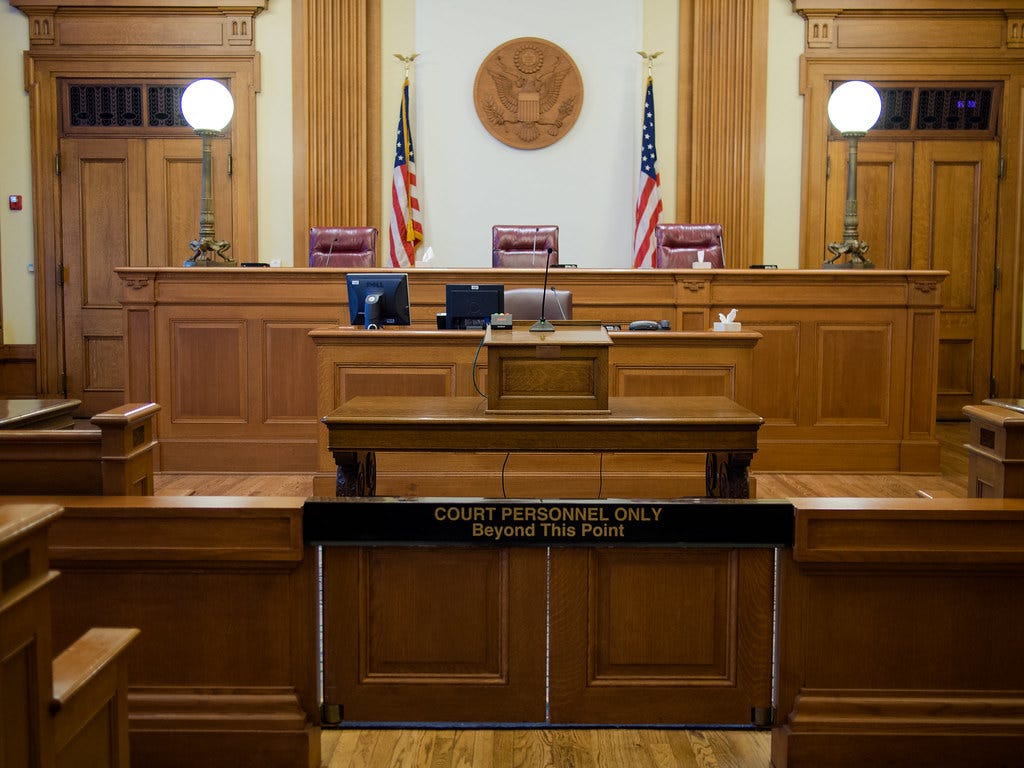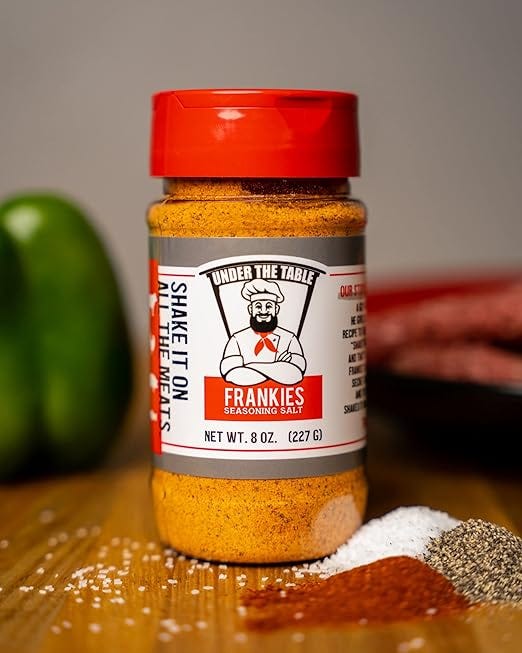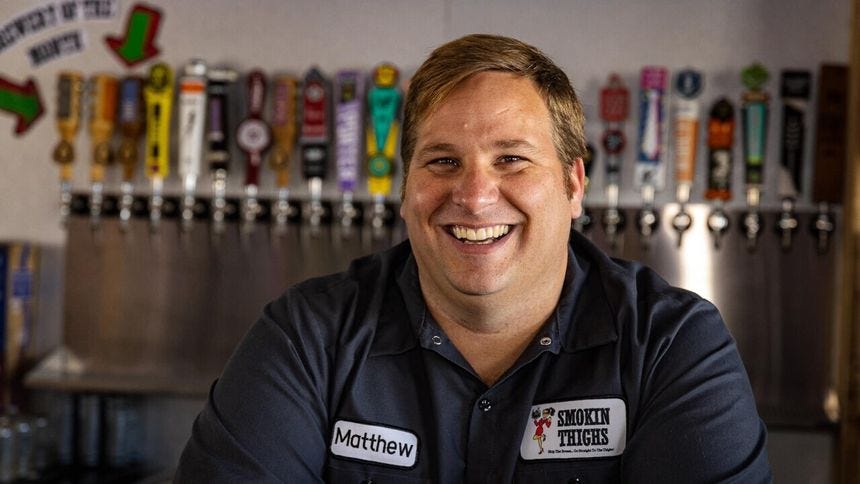Blacklisted: The Criminal Justice System's HIDDEN Agenda
How the establishment legally strips American rights and reinforces their voter base.

We were exhausted and desperate in a Wyoming oil town.
But this was no Clint Eastwood film. Just another super busy assignment during my time as a traveling restaurant consultant, helping people launch their businesses.
The problem: We didn’t have enough staff to keep up with the volume, and the applicant pool was low.
Of course, the owners and partners were happy with the traffic. But I knew the cash flow wouldn’t last as customers lost patience with slow service and screwed up orders.
To beef up the crew, I advised the owner, Sam, to do on-the-spot “interviews” with anyone who dropped off or asked for an application and see if they could start immediately.
So, when Sam denied a college-age kid named Jerry because he admitted to having a criminal record, I felt like I could hit her with a pickle bucket opener.
“We need people to sweep floors, clean tables, and prep food. We aren’t hiring for the Pentagon daycare here,” I quietly snipped at my apprentice as she waddled away to order produce.
Yet, after all, it was her restaurant, not mine, and my replacement was on the way anyway.
After flying home late the following evening, taking a shower, pouring a much-needed bourbon, and sinking into an episode of Boardwalk Empire, it hit me: Sam probably thought Jerry must have committed some unspeakable crime against humanity to earn the socially despised title of “convicted felon.”
But was that kid a threat to staff safety, or was he just trying to get on the straight and narrow?
More broadly, does the government have rehabilitation in mind? Or are they using the criminal justice system to limit American rights and expand their voter base?
How to Legally Strip American Freedoms

Derived from the French word “félonie,” meaning “evil-doer” or “traitor,” courts traditionally reserved felony charges for society’s worst offenders, such as murderers, rapists, and kidnappers.
So it makes sense when employers wince after finding an affirmative response in the criminal history section on job applications. After all, employers are responsible for keeping their staff safe, especially when employing minors.
However, over the years, legislators slowly expanded the felony classifications to include any offense punishable by more than a year in jail. (Anything less is a misdemeanor.)
Sam and other employers might be surprised to learn that trespassing, theft, and falsely pulling a fire alarm are now potential felonies in states like Illinois.
Addicts also find themselves with felony records for personal drug possession, when many of them turned to street drugs after a doctor got them addicted to begin with.
Not to mention the felony factory that was the War on Drugs, which produced countless felons via minimum mandatory sentences for folks caught with half a crack rock, making it difficult to find work. Even though probation and parole conditions require employment.
We know the Prison Industrial Complex generates profit by incarcerating people. However, even if offenders don’t serve a day behind bars, the establishment still wins as convicted felons lose fundamental freedoms.
Maybe that’s why, in recent decades, every US state saw an increase in felony conviction rates.
Plea Bargains

Would you admit to a crime you didn’t commit?
I bet many J6ers would have said no, at least until they found themselves on the business end of a federal investigation with the potential to put them in prison for 30 years for milling about the Capitol.
That’s the game: charge you with an extreme crime, then offer a significantly lesser sentence for admitting to a less severe offense. With high court costs and attorney fees, most everyday Americans can’t afford to fight the state or federal government even if they are 100% innocent.
Everyone “wins.”
The state gets a conviction, and the offender avoids prison or spends less time behind bars.
That’s why, in 2022, about 90% of federal cases ended with a plea deal, and only 1% ended in acquittals. Courts dismissed the rest for one reason or another.
Less Rights=More Votes

It’s not hypocrisy, it’s hierarchy.
That’s why Representative Jamal Bowman got away with a misdemeanor charge for falsely pulling a fire alarm to disrupt a House vote (which is far more insurrection-y than what prosecutors convicted most J6ers for). At the same time, a teenager from Ohio faces felony charges for doing the same thing as a high school prank.
Of course, pulling a fire alarm has severe consequences, such as hindering first responders from reaching real emergencies and wasting municipal resources.
That kid should be punished, for sure. Ten lashings on the fifty-yard line at the homecoming game should do it.
But is blacklisting him for life the best thing for the community? If convicted, that kid will start adulthood with a myriad of obstacles, such as:
Difficulty finding housing
Loss of Second Amendment rights (Shall not be infringed, ahem.)
Inability to vote, although in most states the right is restored after sentence completion
Difficulty getting licenses and certifications, such as a pilot’s license or commercial driver’s license, depending on the offense
Difficulty getting into certain schools or colleges
Impact on child custody and parental rights
Inability to act as an executor of an estate
Exclusion from work in government, law enforcement, medical, education, and other fields
Travel restrictions
Inability to hold local office
Limited federal benefits
Disqualification from certain loans
Exclusion from jury selection (there’s always a silver lining!)
Since it’s harder to make a living, convicted felons are also more likely to become reliant on state and federal handouts and, therefore, are more likely to vote for more government.
Especially when 27% of this scarlet letter community is unemployed as of 2021.
Are these administrative life sentences good for society when convicts can’t even get a lousy job bussing tables or a shoebox apartment to hang their hats?
Still, nobody likes a hug-a-thug. Some people are legitimate threats incapable of rehabilitation. I get that. And who knows, maybe Jerry was one of those people.
Unfortunately, he probably turned to a life of crime, substance abuse, and unemployment.
Not because he didn’t have the potential to contribute to society.
But because we wouldn’t let him.
Redemption is possible, and it is the measure of a civilized society. -Greg Boyle
Brand of the Week: Frankie’s Seasoning Salt

Family-owned and handcrafted in America, Frankie’s Seasoning Salt isn’t just for grilling.
This stuff goes on everything in our house, from breakfast hash to homemade fries to grilled vegetables.
We even throw it on our popcorn.
Just be sure to shake it well before use. Since Frankie’s is all-natural and free of garbage chemicals, it may clump up slightly.
Check ‘under the table’ for Frankie’s Seasoning Salt right here!
US Invasion Casualty of the Week: Matt Carney

Matt Carney was living the American Dream.
After his food truck graduated to brick-and-mortar status in 2012, “Smokin’ Thighs” quickly became a Music City staple. Known for its applewood-smoked chicken, bacon mac and cheese, and “Nerdy Talk Trivia Night,” Nashvillians traveled near and far for the food and the company.
Especially Matt’s.
Unfortunately, two worthless illegal immigrants ran him over while leaving work on June 19th of this year. Matt succumbed to his injuries on July 4th.
What’s more, police arrested these scumbags before, yet a judge released them to terrorize the community.
From Matt’s obituary:
Matt will be remembered for his joyful spirit, his loud laugh and his smile that lit up the room. His friends knew him as the life of the party, with his positive attitude, jokes and loyalty to those he loved. He loved big. Matt was happiest when outside on his boat with friends and family, rock crawling in his KRX side by side, pushing dirt at Highwater or wrenching in the garage with his dog, Mr. Kitty. He was an active member of the Entrepreneurs’ Organization, Nashville Chapter.
Those interested in supporting the family can find Matt’s GoFundMe here.



